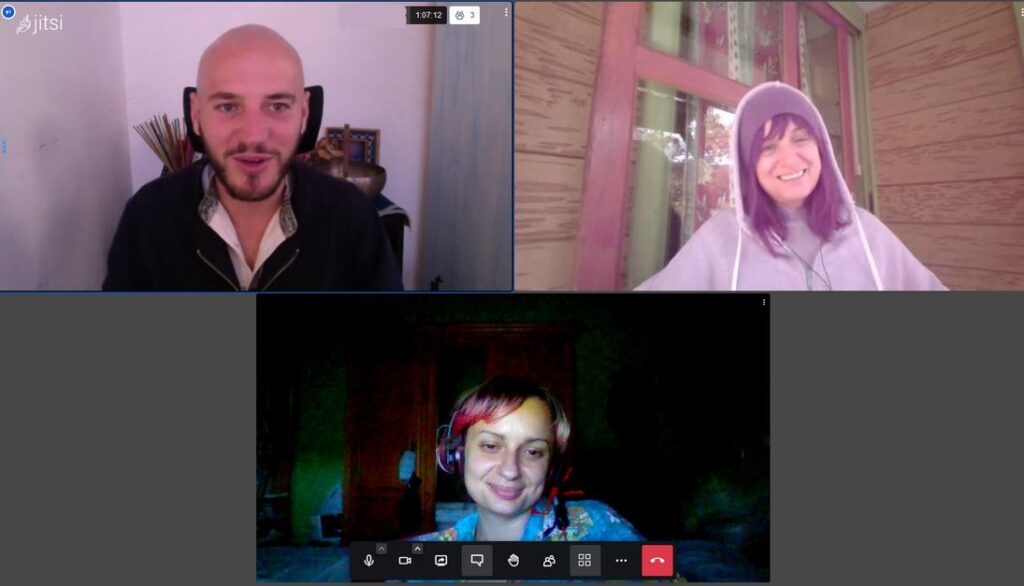This article has been written by Alex Soto,

Screenshot of one of our conversations on co-designing a fairer, more distributed future!
If the pandemic left us something in labor terms, it was realizing that working remotely is not only possible but also has considerable advantages. Saving time, money and energy on unnecessary travel is hard to give up once you have it. And that’s not to mention having greater freedom over when and how to perform day-to-day tasks.
And yet nothing is perfect. Working from home, without being able to count on schools and other spaces to care for children, meant adding an extra workload for many mothers and fathers.
Which, I think, triggered an even deeper conversation, for a long time ignored: the way in which we distribute carework.
Carework is defined as “all tasks that directly involve care processes done in service of others.” What many times can mean the job of literally taking care of other people, such as children, the elderly and the sick, but also involves many other things.
“Care work is at the heart of good governance for the operation of any collective.”
And this is because, carrying out caring processes in service of others in a work environment, often means devoting time to what is not directly proportional to ‘my individual results’ but to what would be good for the organization as a whole.
That means taking the time to arrange the folders on the shared drive so they’re clearer, arranging the columns of a spreadsheet for easier reading, and/or taking the time to update an operating manual when you realize it’s getting outdated. All those jobs that you appreciate when someone else does them, but you don’t necessarily feel the urge to do them yourself.
Carework is important because it is the type of work that if nobody does, things don’t work. And yet, these roles tend to be invisible and poorly compensated. In fact, on many occasions, this work was not even recognized as such.
Until the pandemic revealed all the work that women had to carry for the simple fact of being identified as the source of carework. Being locked up simply made visible the lack of an equitable distribution of those responsibilities.
What was perhaps less evident is how this logic also applies within our organizations; and the importance of this type of work in times of great change.
If we agree with the notion that organizations that maintain a ‘continuous learning’ pace can be more resilient than those with fixed and inflexible processes, then learning to adapt to context is one of the most important characteristics in a vuca context.
The big question, then, is ‘how do organizations learn?’
The answer I propose is; the ‘continuous learning’ of an organization is achieved through ‘open governance’ (i.e. the ‘how we work’ list of policies, standards and agreements) where all members have both the authority and the responsibility to systematise those lessons that took place in the field.And this, you see, is a technical way of referring to the same care work we were talking about earlier.
In many organizations, workers are in such a hurry to meet their individual goals, which are often tied to their income, that they don’t see it as strategic to move the stone out of the way for the next person who walks by. Although a system of individual results promotes efficiency in operations, it often does not reserve time or energy to write down what has already been done to generate collective learning. And when the person leaves, the knowledge is also lost. In other words, as long as organizations do not recognise, integrate and promote ‘organizational care work’ (i.e. participatory governance processes to improve operating arrangements), members will see no value in spending time on it.
On the other hand, if there is interest but you don’t know how to do it, a possible solution is in a model proposed by the DisCO.coop team, who were inspired by P2P/Commons, cooperative and feminist economic perspectives. Thanks to their work, different groups have integrated carework (and even pro-bono work titled as ‘love work’) into the monthly income that people receive for contributing to their collective purpose.
In the Elements publication, the Disconauts explain “this can mean different things for the existing DisCO Labs, but likely includes being attentive to others’ circumstances and gently inquiring when something left unsaid is nonetheless perceived, as well as the ongoing practices of mentoring and mutual support.” The powerful thing is that each group is free to define what ‘care work’ means in their particular context.
Whether emphasizing a peer mentoring program, or fun induction processes, or interactive role succession manuals, or active listening circles, or any processes done in service of others, carework will be the difference between organizations that retain their talent and those who don’t.
Equitably distributing carework allows us to take better care of ourselves (whether at home, at work and/or in any other development space). The question is whether we are ready to acknowledge it in the first place.
Credits:
Image: “Izöl”, by Laura Gonballes

